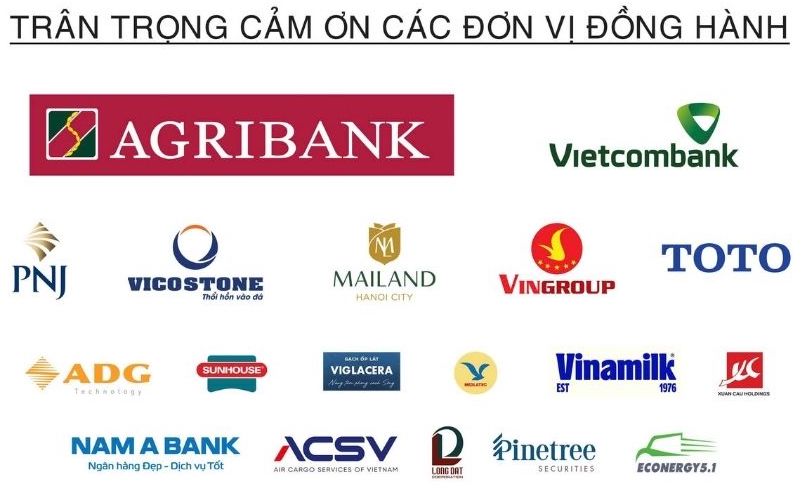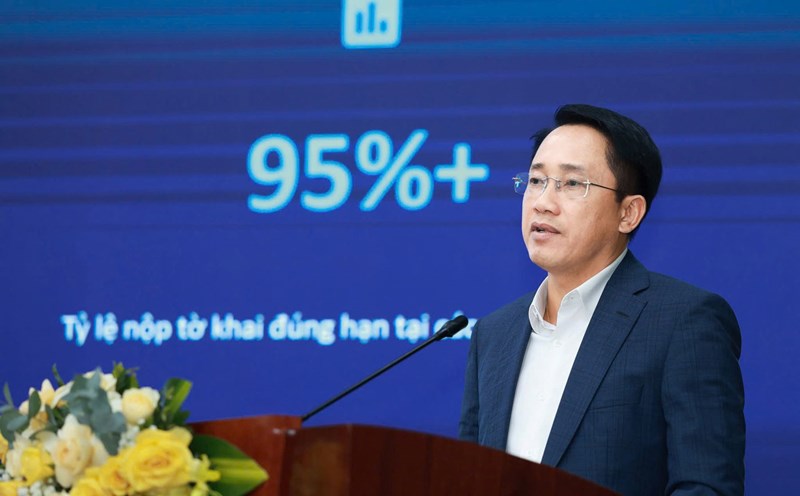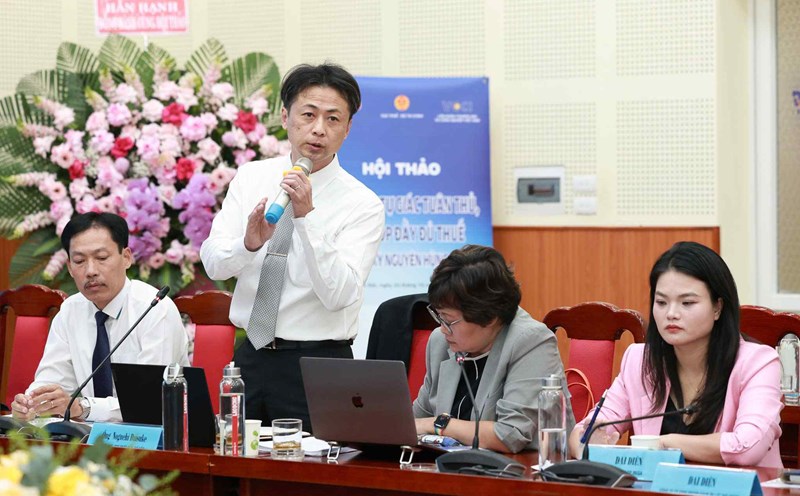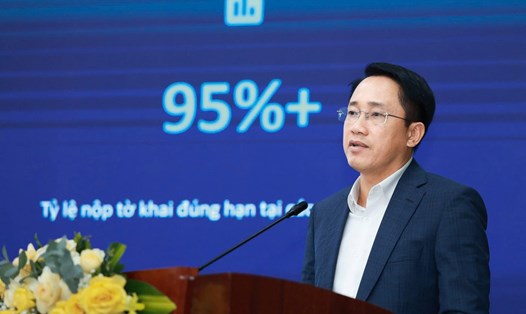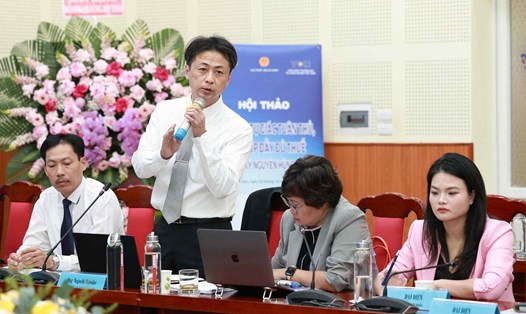Tax fairness assessment in the overall standards of a good tax system
vertical tax fairness is closely related to the principle of taxation based on payment capacity. Payment capacity is most directly and clearly demonstrated in income and assets. The higher the income, the higher the ability to pay. The more valuable assets you have, the higher your ability to pay.
equity in every aspect is understood as a principle of taxation, according to which people who are the same in all aspects must treat each other equally in taxes. The basis of this principle is associated with the development of human civilization with the desire to towards the truth of equal treatment for equal people.
In addition, considering tax fairness must also be placed in the general conditions of economic management policies and fiscal policies of a country.
Why is tax justice the foundation for limiting tax evasion and nurturing sustainable development?
When the fairness of the tax system is widely recognized by the majority, it creates great support from the public in organizing the implementation of tax policies. At the same time, when the majority of people feel satisfied with the fairness of the tax system, it creates motivation to comply with taxes better and reduces tax evasion motivation. Having better labor motivation thanks to the sense of fairness, in turn, it creates motivation to contribute to workers and sustainable production and business development.
The fairness of the Vietnamese tax system
General policies and orientations
In terms of policy, our Party and State always strive to build and perfect a fair, transparent, effective tax system in accordance with international practices. This is clearly demonstrated in the Tax System Reform Strategy through many different stages. The Party's socio-economic development strategy for the period 2011-2020 stipulates that "National financial policies must reasonably encourage, distribute and effectively use all resources for socio-economic development; and distribute benefits fairly".
In the direction and tasks of socio-economic development, the Socio-Economic Development Strategy for the period 2021-2030 is more specifically stated as follows: "Expand the collection base, ensure fairness and neutrality of tax policies, promote the application of information technology, simplify administrative procedures, reduce compliance costs with tax and fee payment procedures for people and businesses".
The general goal of the Tax System Reform Strategy to 2020 issued with Decision No. 732/QD-TTg of the Prime Minister is to determine "Building a synchronous, unified, fair, and effective tax policy system, in line with the socialist-oriented market economy; reasonable incentives to facilitate domestic production promotion".
Decision No. 508/QD-TTg dated April 23, 2022 of the Prime Minister approving the Tax System Reform Strategy to 2030 determines the viewpoint of"...reasonably mobilizing revenue sources for the state budget, ensuring the consistency, fairness, and neutrality of policies; simple, transparent, clear, easy to understand, and easy to implement".
Advantages and results achieved in the aspect of tax fairness
Personal income tax: For the tax system of every country, personal income tax is considered the top important tax in income regulation, ensuring social justice. From 1990 to 2008, Vietnam imposed income tax on high-income people. Regular income is subject to a progressive tax rate with 5 tax rates from 10% - 50%.
From January 1, 2009 to 2014, the progressive tax table with 7 tax rates from 5% to 35% applies to income from salaries, wages and business of residential individuals.
From January 1, 2015 onwards, this progressive tax rate will only apply to income from salaries and wages of residential individuals. Business income is taxed at a percentage of revenue without applying the progressive tax rate. The remaining incomes apply the same tax rate for different tax rates.
Also from January 1, 2009, Vietnam switched from a standard deduction system to a family deduction system. Thus, it can be seen that Vietnam has consistently applied the principle of progressive personal income tax, even though the tax rate has changed over time. This ensures the vertical fairness of personal income tax. In addition, from January 1, 2009, the family deduction system will be applied to replace the standard deduction system.
Special consumption tax: Although there have been changes over time, the general orientation that has been thoroughly grasped when developing and perfecting policies and laws on special consumption tax in Vietnam is to impose a high tax on some high-end goods and services - goods and services that are the subject of spending by high-income people in society. The Law on Special Consumption Tax 1998, effective from January 1, 1999, stipulates a number of high-end goods and services subject to tax such as: Cars with less than 24 seats; services: nightclub business, etc.
The 2008 Law on Special Consumption Tax, effective from January 1, 2009, adds aircraft and yachts to the list of subjects subject to special consumption tax. Law on Special Consumption Tax (amended) No. 66/2025/QH15, effective from January 1, 2026, adjusts the taxable subjects for air conditioners in the direction of eliminating air conditioners used by people with average or lower income from the special consumption tax.
Accordingly, the taxable subject is "Thermonically harmonious temperature with capacity from 90,000 BTU or less" converted to "Thermonically harmonious temperature with capacity over 24,000 BTU to 90,000 BTU". Special consumption tax rates are also designed basically in the direction that the higher the goods and services, the higher the tax rate.
Value Added Tax: This is a tax that most countries choose as their main goal to ensure revenue instead of social justice. Value-added tax is also a tax with a series of depreciation compared to income because the tax amount is calculated according to the selling price of goods and services. However, Vietnam's policy choices in recent times have still combined to ensure fairness in value added tax.
Property tax: In Vietnam, there are currently 2 types of tax in the property tax group: agricultural land use tax and non-agricultural land use tax. In particular, agricultural land use tax has almost completely exempted tax for taxpayers according to a number of resolutions of the National Assembly until 2030.
Corporate income tax: Vietnam's corporate income tax has changed a lot over time, especially regulations on tax rates and tax incentives. From the perspective of tax justice, there is the following notable content:
Before the tax calculation year 2004, the corporate income tax rate distinguished between Vietnamese enterprises and foreign-invested enterprises (Foreign-invested enterprises are subject to a tax rate of 25%, domestic enterprises apply a tax rate of 32%);
From the tax calculation year 2004, both domestic and foreign-invested enterprises will apply the common common tax rate of 28%, then reduce it to 25% from the tax calculation year 2009, down to 22,2% from the tax calculation year 2014 and down to 20% from the tax calculation year 2015;
Tax incentives also change in the direction of unifying tax incentives between Vietnamese enterprises and foreign-invested enterprises from the tax calculation year 2004;
Some limitations need to be overcome to make the tax system more fair
Regarding personal income tax
The tax rate for inheritance and gift receipt only applies a single tax rate, without making progress, which is not really fair in income regulation.
The tax rate for income from real estate transfers is not included in the time holding real estate, so it has not contributed to income redistribution, ensuring social justice and limiting real estate speculation.
The method of determining tax rates for income from real estate transfers and securities transfers is only based on the percentage of the transfer price without the option of applying transfer interest, which is no longer suitable for practical conditions, not accurately reflecting the nature of the tax calculated on income from interest.
On special consumption tax
The tax rate for some high-end goods and services is not really suitable. Although airplanes, helicopters, launched ships and yachts are very high-end goods, the tax rate is only 30%, much lower than lower-end goods. The tax rate for golf business services at 20% is not really commensurate with the high level of this service.
Some high-end goods and services but not yet subject to special consumption tax such as: Cosmetics, cosmetic services...
Regarding property tax
The progressive tax rates for non-agricultural land use tax according to the current land use limit in Vietnam are 0.03%; 0.07% and 0.15%; for land used for the wrong purpose are 0.15%; encroached land is 0.2%. Thus, it can be seen that Vietnam's current non-agricultural land use tax rate is too low compared to international practice.
The progressive tax rate according to the land use limit is not completely linked to the value of the land, so it is not fair in income regulation, because the value of the land is determined according to the land area multiplied by the price of each m2 of land, in which, the value of each m2 of land is a very important factor deciding on land prices, in some cases the price difference is tens, hundreds, even thousands of times.
Proposal to adjust tax laws to improve the fairness of the Vietnamese tax system
Regarding personal income tax
First, it is necessary to supplement and restructure income that is essentially income from interest. At the same time, when listing taxable incomes from asset transfers, in addition to these two general additions, it is necessary to add 3 more items as follows:
Income from digital asset transfers according to the provisions of the law on digital technology industry;
Income from gold transfers;
Income from transfers of other assets as prescribed by the Government.
Second, it is necessary to add to income from inheritance and gift receipt of other assets: Digital assets, deposits at banks and credit institutions and other assets according to Government regulations. With the advent of the Law on Technology Industry No. 71/2025/QH15, there is a full legal basis for tax management on income from receiving gifts and inheriting digital assets.
Third, it is necessary to narrow the tax exemption for income from inheritance and gifts such as real estate between husband and wife; biological father, biological mother and biological child; adoptive father, adoptive mother and adopted child; father-in-law, mother-in-law and daughter-in-law; father-in-law, mother-in-law and son-in-law; grandfather, grandmother and grandchild; paternal grandfather, maternal grandmother and grandchild; brothers, sisters and brothers together.
Fourth, on tax rates for salaries and wages. The draft Law on Personal Income Tax proposes 2 options to adjust personal income tax rates for income from salaries and wages of residential individuals.
Fifth, study the adjustment of the level and method of adjusting the family deduction level according to the following basic directions:
On special consumption tax
Add some high-end goods and services to the list of special consumption tax: Cosmetics, beauty services, spa services. Adjust to increase tax rates for some high-end goods and services according to the principle that the higher the goods and services, the higher the tax rate. Accordingly, it is necessary to increase tax rates for aircraft, helicopters, tourists, yachts and golf business services.
Regarding property tax
Specific land price thresholds to apply progressive tax rates need to be determined based on investigation data on land prices in relation to residents' income. At the same time, it is advisable to maintain 3 progressive tax rates according to land value but adjust the tax rate increase with specific rates of 0.2%, 0.4% and 0.6%.
Research on taxation options for housing. When taxing houses, it is necessary to consider the non-taxable housing threshold to ensure that there is no tax for people with average income or less.
